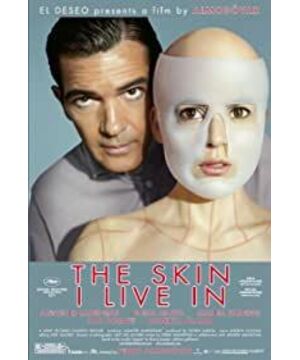It's a movie full of lust, voyeurism, imprisonment, revenge and death. However, under its erotic appearance, there is a male midlife crisis hidden. Antonio. Banderas plays Robert, a wealthy middle-aged physician. However, the artificial skin he developed using genetically modified methods, although a major breakthrough in medicine, violated medical ethics. Therefore, his research was also ordered to stop by the senior management of the hospital. The bottleneck period in career can be said to be encountered by many middle-aged people. The resulting anxiety is often an important factor in triggering a mid-life crisis.
But Robert's crisis was far more than that. He imprisoned a woman named Vera (Elena Anaya) at home. And she was the subject of his experiments. As the plot progresses, the audience learns that Robert's wife, Gal, eloped with someone twelve years ago. On the way to elope, she unfortunately encountered a car accident and was seriously burned. And Robert started experimenting with artificial skin just to treat his burnt unrecognizable wife. However, although Gal survived the car accident, he chose to commit suicide by jumping off the building. It can be said that Gal's runaway and suicide twice announced the end of Robert's husband's identity.
Later, the audience learns from Robert's housekeeper (and his mother) Marilia (Marisa Paredes) that the one who eloped with Gal was Robert's half-brother Zeca (Roberto Álamo). And Zeca's sudden intrusion further reveals the problems Robert and Gal have with their sex lives. Unlike Robert, Zeca is a vulgar street gangster. With little education, he has been engaged in criminal activities such as drug trafficking and robbery since he was a child. During a carnival, Zeca robbed a jewelry store during the chaos. To escape the police, he broke into Robert's mansion and sought refuge with his mother, Marilia. And Zeca's image is worth exploring. In order to better disguise himself in the carnival, he dressed himself up as a tiger. And his tight-fitting tiger suit not only highlights his masculine features, but also hints at his strong sexuality. Later, Zeca found Vera and violently raped her. Compared to the seemingly suave Robert, Zeca's image is full of male hormones and aggression. And Robert's wife Gal chose to elope with Zeca in a way that implied that Robert was unable to meet Gal's needs sexually. At the same time, the complex eroticism between Robert and Vera and the number of sexual terminations between the two reveal the powerlessness and anxiety of the middle-aged man in his sexual life.
In addition, the death of Robert's daughter Norma (Blanca Suárez) further deepens his sense of crisis. Norma developed a mental disorder after witnessing her mother's suicide. Since then, he has been admitted to a psychiatric facility. Years later, Norma's condition seemed to improve and she was allowed to leave the hospital early. At a wedding, Norma meets a young man Vicente (Jan Cornet) and has a crush on him. However, just as Vicente is about to have sex with her in the garden, Norma's illness flares up again, and he thinks Vincente is going to rape her. Frightened and helpless, Vicente can only knock Norma out and flee. Norma's condition deteriorated and, like her mother, she committed suicide. Likewise, Norma's death ended Robert's other male identity - father.
It should be said that Robert took good care of Norma. But like many other middle-aged people, he faces the moment when his grown children leave home. At the wedding reception, Norma's secret affection for Vicente not only shows that she is an adult, but also marks that Robert's patriarchal position is beginning to face challenges. Norma's illness and suicide only accelerated the process. Therefore, Robert's various care for his daughter can also be said to be a kind of protection for his fatherhood. It is because of his daughter's dependence on him that he has the authority of a parent. And it all ended because of the daughter's adulthood and the daughter's affection for another man.
So, Robert's series of revenge against Vincente, not just because of the death of his daughter, but more importantly because the young man threatened his patriarchal status. This also explains why Robert physically imprisoned Vincente and performed sex reassignment surgery on him. A castrated man is often seen as less aggressive in traditional gender perceptions. By transgendering Vincente, Robert removed a young man's masculine threat to him. Imprisonment became Robert's means of maintaining his parent's authority. In addition, the practice of skinning Vincente and reshaping him to look like his dead wife reflects Robert's desire to rebuild and restore his patriarchal position in the relationship.
It can be said that "My Gorgeous Skin" is a film full of anxiety among middle-aged men. The film exposes the various crises faced by Robert, a middle-aged man, in career, sexual life, and family relations. And the extreme measures he took to this end not only made people see the moral chaos shown by the character Robert in the face of love and hatred, but also made people see a middle-aged man's threat to his self-worth and social status. Anxiety and powerlessness displayed by the mark. Maybe that's why the film's title uses the first person. Because when Robert gave Vincente a new skin, he was also trying to hide his midlife crisis anxiety under a calm and refined skin.
View more about The Skin I Live In reviews











